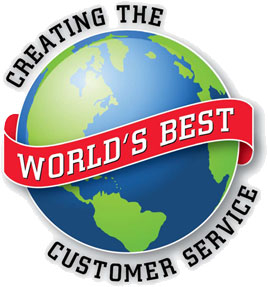“How the Make-You-Happy Management System Will Help You and Your Business When Disaster Strikes”
What Goes Around Comes Around is one of my wife – Patty’s – favorite sayings, and since we’ve been together since 1970 I’ve heard her say it thousands and thousands of times.
The Make-You-Happy Management System (MYHMS) puts a huge emphasis on respect for clients and customers. Remember, in the MYHMS clients are the people that most businesses call customers, and customers are your internal customers; team members, vendors, the FedEX guy, the mail man, etc. This leads to treating all of these internal customers like… CUSTOMERS, and you know, what goes around comes around.
On July 20, 2003 we had a fire at our distribution center in Denver that destroyed everything. Twenty thousand square feet of inventory, office supplies and fixtures, computer, everything gone, overnight. I remember the date, because it happened on my 29th wedding anniversary. Little did I know how much one of Patty’s favorite sayings would affect us over the next few months.
Let’s look at just a few aspects of the MYHMS and how they helped us during this disaster in Denver:
- The MYHMS with its Z-theory management and emphasis on not only listening to your team members but empowering them creates team members who know they are incredibly valuable, feel appreciated. This, along with the philosophy that all of us who work in a MYHMS business are customers to each other leads to people who truly enjoy their jobs. The way the team in Denver, and our other locations pulled together to get the job done through this was amazing.
- At the very heart of the MYHMS is a fanatical devotion to Make-You-Happy Client Service. This created loyal clients who rallied around us.
- The idea that your vendors are your customers creates vendors who help you when you need it.
When you have all of this going for you and have a disaster you’ll truly find out that, “What Goes Around Comes Around.”
Team Members Come To The Rescue
On the sales end, we were fortunate in that we had a show room at the Denver Merchandise Mart. We added another phone line and were up and going there right away.
Our warehouse staff was concerned that they may not be able to work while the Denver distribution center was out of commission. I assured them that we would keep paying them. They could have easily just sat back and collected the money over what ended up being about a month, but each of them offered to take their vacation at that time.
In addition, as soon as anything came up that they could do they went at it full speed. They shopped for warehouse racking, found storage units, and shopped for new office furniture.
When the time came to start putting things back together the entire staff in Denver came through like gang busters to get us up and going, working weekends and extended hours.
In addition, our staff in Kent came to the rescue also. We shipped most of the orders that would have come from our Denver distribution center out of Kent. Like Denver, when needed, our staff in Kent worked long hours, with a great attitude to get the job done.
In addition, our entire staff, in all of our divisions, did an incredible job keeping up with all of the different shipping arrangements that needed to be arranged to take care of clients and get product to them.
I will forever be grateful to our team members… What goes around comes around.
Vendors Come To The Rescue
Our vendors were absolutely incredible!
As a distributor, we buy product in huge quantities, often truckloads. We store these and ship them in smaller quantities when our clients need them. Some of our vendors will allow us to drop ship smaller quantities, but they have extra charges to do this.
While we shipped a lot of orders for the mountain states and east out of Kent and charged our clients what the freight would have been from Denver, with the loss of the entire Denver inventory we didn’t have enough inventory in Kent to do this all of the time.
Our vendors came to the rescue and, every one of them, agreed to waive their minimum order quantities and extra charges and ship to our clients directly when needed. This was a huge commitment from them and their teams as they are simply not set up to do this in the quantities that they did for us.
I will forever be grateful to our vendors… What goes around comes around.
Clients Come To The Rescue
What a time to find out how loyal our clients were! Things took longer. For the most part things ran well, but some things simply took longer. It took longer for us to let them know when the order would ship because we had to be sure whether we were shipping it from Kent or the vendor, whether it was something that could drop ship from the vendor or not, and lots of other new questions.
And then it still took longer, to get the product from Kent rather than Denver. Most often the vendor simply couldn’t get it shipped the same day like we do.
We were amazed and thankful that our clients (Continued P5 – Disaster Strikes)
stood by us. In fact, we got letter after letter thanking us for taking such good care of them under the circumstances.
I will forever be grateful to our clients… What goes around comes around.
What Goes Around Comes Around Negatively Also
Over the years I had been approached numerous times by a business associate to buy his business. He gave me an idea of the price he was looking for and I always told I didn’t think it would fit at the time.
One day he called me and said he wanted to sell the business. I again told him I again that I really didn’t think it would fit. He replied, “I’m going to make you a deal you can’t refuse.” So, I listened. It was a deal I couldn’t refuse.
The other owner and I had the same supplier for one of our product lines. In our case they were a significant and good supplier. For the other company this supplier represented the huge majority of his business.
Over the years the other owner talked to me about all of the problems he had with the supplier and in fact showed me some of their correspondence. I couldn’t believe the derogatory tone of the letters from the owner of the business who wanted to sell to the supplier.
He certainly had no idea that he and the supplier were in fact on the same team. He had no comprehension that he should treat a supplier like an internal customer
I found out during the negotiations to buy the business that after years of this derogatory treatment the supplier decided he simply wasn’t going to sell to the other business anymore.
And, in this case the guy who wanted to sell the business did not have an alternative supplier and it was going to take a good deal of time to find one. The seller knew I had a good relationship with the supplier and that the supplier would sell to me if I bought the business. The seller also knew that his list of potential buyers was very small, because the seller would not have had a relationship with the new buyer and would see it as still dealing with the old owner. What goes around comes around.
So yes,
I got the company in a deal I couldn’t refuse
It didn’t surprise me as we trained our new team in this newly acquired business that our Make-You-Happy Management with its emphasis in respect for everyone was a foreign concept. And it didn’t surprise me at all to learn that the old owner was very much an X-theory manager with the attitude of I’m the boss, I’m the manager, I’m the owner. I built this business with my blood sweat and tears do what I tell you to do and that’s that!
The new team was thrilled to hear about the new management system. What goes around comes around.
You can get my hardcopy book (not an e-book), How to Control Your Business and your Life, Proven Secrets to Creating Highly Productive Teams at www.HowToControlYourBusiness.com. Your cost is $2.97 and that includes shipping and handling.





